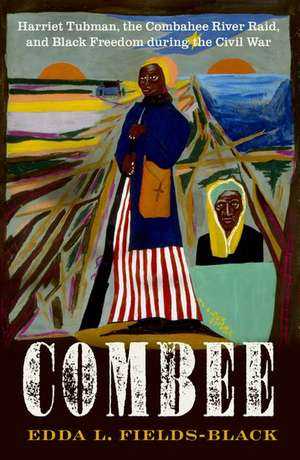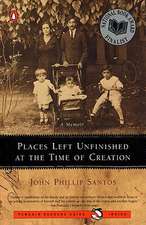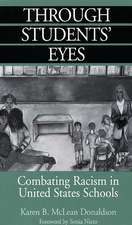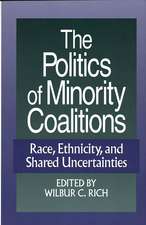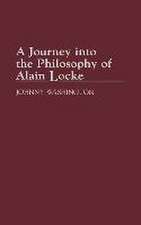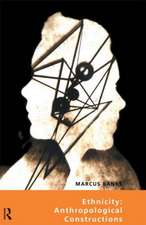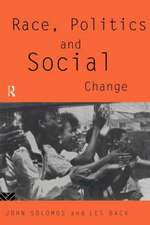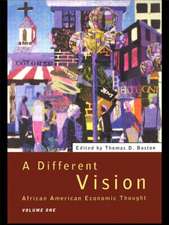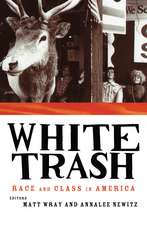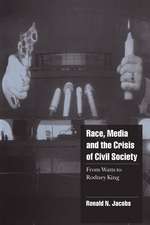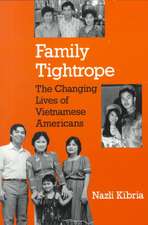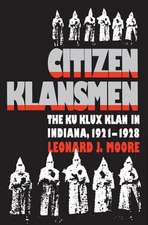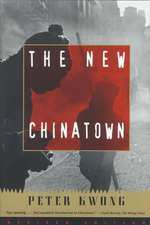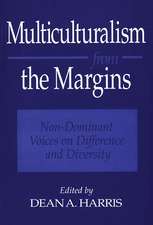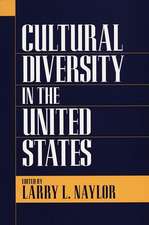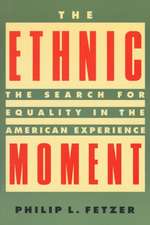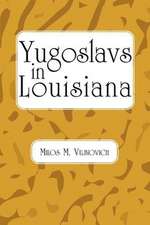COMBEE: Harriet Tubman, the Combahee River Raid, and Black Freedom during the Civil War
Autor Edda L. Fields-Blacken Limba Engleză Hardback – 19 iun 2024
Preț: 199.54 lei
Preț vechi: 218.25 lei
-9% Nou
Puncte Express: 299
Preț estimativ în valută:
38.18€ • 40.83$ • 31.84£
38.18€ • 40.83$ • 31.84£
Carte disponibilă
Livrare economică 17-22 martie
Livrare express 12-18 martie pentru 82.75 lei
Preluare comenzi: 021 569.72.76
Specificații
ISBN-13: 9780197552797
ISBN-10: 019755279X
Pagini: 776
Ilustrații: 116 color plates and 3 maps
Dimensiuni: 165 x 239 x 51 mm
Greutate: 1.41 kg
Editura: Oxford University Press
Colecția OUP USA
Locul publicării:New York, United States
ISBN-10: 019755279X
Pagini: 776
Ilustrații: 116 color plates and 3 maps
Dimensiuni: 165 x 239 x 51 mm
Greutate: 1.41 kg
Editura: Oxford University Press
Colecția OUP USA
Locul publicării:New York, United States
Recenzii
Edda Fields-Black takes a legendary event and an iconic figure and with pathbreaking research and elegant prose gives us a striking, living, and breathing history of Black courage and freedom dreams at the dawn of emancipation.
Thanks to her careful reading of Civil War-era documents and historical sources, some never before utilized, Edda L. Fields-Back gives eloquent voice to South Carolina's rice kingdom's enslaved men and women, including her own ancestors, and offers new insights into the experience of more prominent figures, most notably Harriet Tubman. COMBEE makes us think in new ways about the role of African Americans in the destruction of slavery, and the hopes, betrayals, and transformations that accompanied emancipation.
A riveting and original account of Harriet Tubman and the Combahee River Raid, COMBEE is an absolutely essential book-not just for understanding the distant past, but for offering context and insight into tragic events in our own times, and the shadow of racism that still looms over Charleston, Charlottesville, and the nation.
Despite boatloads of Civil War books, no one has dug more deeply into the 1863 Combahee River Raid than Edda Fields-Black. COMBEE brings that daring event alive and establishes its important place in the broader narratives of Harriet Tubman's life and the war to end slavery. Poring over pension files, trapsing through Lowcountry marshes, and tracking down plantation descendants, Fields-Black has left no pluff mud unturned in pursuing this dramatic story, weaving together the lives of her central "freedom seekers"-including her own third great grandfather-with those of Northern commanders and liberated Black Carolinians.
Fields-Black vividly recounts one of the most dramatic events of the Civil War era, revealing Harriet Tubman and her revolutionary glory in exciting, original ways.
Edda Fields-Black doesn't just bring fresh energy to Harriet Tubman's story but, from the shadow of memory, rescues a generation of people who throughout the Lowcountry of South Carolina and Georgia, fought for their freedom, crafted a new cultural, political, and economic identities, and provided a model to the nation for a new birth of equality and justice following the Civil War.
Fields-Black's deep archival research on the participants in the raid transforms our understanding of the event. Tubman doesn't disappear, but now the stories of the other participants emerge. In so doing, they will actually reemphasize the heroism of Tubman herself, as an apotheosis of Black (and Black women's) resistance traditions.
There is a gripping and well-told story about Harriet Tubman and the Civil war at the center of COMBEE, but what stands are the details around the edges of the story, about the history and daily lives of enslaved and free people on the rice plantations. I came away from the book with a realer, thicker understanding of the lives of the people of Combee.
In COMBEE, Edda Fields-Black gives an underappreciated episode in the history of Harriet Tubman, the Black freedom struggle, and the Civil War the careful and care-full treatment it deserves. More than that, this book brings to light whole worlds contained within a grain of time, lifting up the names and stories of freedom seekers whose voices still resonate powerfully today.
Sprawling and kaleidoscopic, this is a marvel of deep research.
Through herculean research and cross-referencing of land, bank, U.S. Army pension and slavery transaction records, Fields-Black is able to name names and offer readers a sense of who these people were and what their lives were like. Combee holds many additional revelatory threads and insights, but this act of resurrection alone makes the book profoundly important.
A scholarly and remarkable work about enslavement and Civil War...Readers will gain a deeper understanding of that era's times and experiences, and Fields Black's connection to one of the participants makes it a personal work as well.
With an extensive cast of characters, dramatic action, and findings of great significance, Combee is an exceptional work of American history.
These stories, these places, these events of Combahee are legendary. But these stories are not legends, and these actions of Harriet Tubman and her fellow freedom fighters are not mythology - these are the true accountings of heroism, determination, and unparalleled commitment to freedom. This book demands that you feel the chills of muddy water; burn with the anger of suffered indignity; and immerse yourself in the adrenaline and courage of some of the bravest people our nation has ever known. In a time when truth seems malleable, books like COMBEE and historians like Dr. Edda Fields-Black are essential to preserving and propelling stories like this into the consciousness of the world. The story of Combahee River Raid is one of the greatest American history stories of all time- and we should all know it.
In her groundbreaking book... Edda Fields-Black tells the rousing story of the Union army's Combahee river raid, which led to the liberation of hundreds of enslaved African-Americans in 1863. Skillfully using pension files and planter records, Ms. Fields-Black...recovers the lives of 'the Combahee freedom seekers through multiple sets of transactions' -records of slave sales, Confederate compensation affidavits and land purchases.
Remarkable new history...
Fields-Black's deep research and breathtaking prose bring to life the 'nameless and faceless enslaved people' who, no less courageous than Harriet Tubman herself, participated in the Combahee River Raid, their heroic actions creating what Fields-Black identifies as 'a small fissure' in the wall around the institution of slavery.
Combee is a transcendent, once-in-a-generation historical exploration of a world mostly veiled in the river damp that rises from the lower Combahee - the long submerged rice plantations of the South Carolina Lowcountry. It tells the story of backbreaking toil under a relentless summer sun; of personal courage and fortitude by numberless, heretofore nameless enslaved men, women, and children. Read closely and one can almost hear the sound of three Yankee gunboats chugging through a humid June dawn carrying 300 Black men outfitted in blue tunics, shiny brass buttons, toting muskets with gleaming steel bayonets, led by an indefatigable Black woman known as "Moses."
Edda Fields-Black has created a monumental work...COMBEE is a ring-shout of a book.
This extraordinary offering, Combee, transcends regional narratives and contributes to a larger collective of human interest stories.
Fields-Black's new history, Combee, powerfully situates Tubman among her contemporaries- not only the controversial military geniuses who advanced the war effort through espionage, river raids, and guerrilla tactics but fellow freedom seekers who, like Tubman, chose to go back down to pharaoh's land and fight
This book represents an important contribution to Civil War history, alongside the history of Black resistance to slavery in the United States.
Elegantly written, this thick volume is supported by 15 appendixes that include the names of liberated bondmen, the names of Tubman's scouts, military orders, correspondence by both white and Black participants, and 151 pages of endnotes.
At times, Fields-Black's prose reads as fiction, complete with the sense of character and Fields-Black's gift of dramatization, of setting the scene.We learn and feel so much with respect to Harriet Tubman, along with John Brown, Frederick Douglass, just to name a few. Not to mention the freedom seekers who heretofore were unknowns until their heroic stories were unearthed and pieced-together...By the time those three gunboats enter the twenty-five-mile-long stretch of the Combahee River with their contingents of Black regiments, readers are sitting at the edge of their seats...COMBEEÂ is above all a history book that offers knowledge culled from painstaking research. It is driven by a need to recover and restore the missing voices that sing freedom through generations of both heroism and suffering. This book is a stunning artifact in and of itself.
Combee: Harriet Tubman, the Combahee River Raid, and Black Freedom during the Civil War is Fields-Black's exhilarating history of Tubman and the heroic everyday men, women, and children who escaped from slavery during the Combahee River Raid. Despite its daunting seven-hundred-plus pages, this long-awaited history makes for a compelling, page-turning narrative, helped along by Fields-Black's clear storytelling and concise writing style. With meticulous attention to details and to careful research, which relies mostly on U.S. Civil War pension files, slave testimonies, and the various biographies written about Tubman, she maps out the shared destiny of different enslaved African Americans who had little in common other than their desire for freedom.
Thanks to her careful reading of Civil War-era documents and historical sources, some never before utilized, Edda L. Fields-Back gives eloquent voice to South Carolina's rice kingdom's enslaved men and women, including her own ancestors, and offers new insights into the experience of more prominent figures, most notably Harriet Tubman. COMBEE makes us think in new ways about the role of African Americans in the destruction of slavery, and the hopes, betrayals, and transformations that accompanied emancipation.
A riveting and original account of Harriet Tubman and the Combahee River Raid, COMBEE is an absolutely essential book-not just for understanding the distant past, but for offering context and insight into tragic events in our own times, and the shadow of racism that still looms over Charleston, Charlottesville, and the nation.
Despite boatloads of Civil War books, no one has dug more deeply into the 1863 Combahee River Raid than Edda Fields-Black. COMBEE brings that daring event alive and establishes its important place in the broader narratives of Harriet Tubman's life and the war to end slavery. Poring over pension files, trapsing through Lowcountry marshes, and tracking down plantation descendants, Fields-Black has left no pluff mud unturned in pursuing this dramatic story, weaving together the lives of her central "freedom seekers"-including her own third great grandfather-with those of Northern commanders and liberated Black Carolinians.
Fields-Black vividly recounts one of the most dramatic events of the Civil War era, revealing Harriet Tubman and her revolutionary glory in exciting, original ways.
Edda Fields-Black doesn't just bring fresh energy to Harriet Tubman's story but, from the shadow of memory, rescues a generation of people who throughout the Lowcountry of South Carolina and Georgia, fought for their freedom, crafted a new cultural, political, and economic identities, and provided a model to the nation for a new birth of equality and justice following the Civil War.
Fields-Black's deep archival research on the participants in the raid transforms our understanding of the event. Tubman doesn't disappear, but now the stories of the other participants emerge. In so doing, they will actually reemphasize the heroism of Tubman herself, as an apotheosis of Black (and Black women's) resistance traditions.
There is a gripping and well-told story about Harriet Tubman and the Civil war at the center of COMBEE, but what stands are the details around the edges of the story, about the history and daily lives of enslaved and free people on the rice plantations. I came away from the book with a realer, thicker understanding of the lives of the people of Combee.
In COMBEE, Edda Fields-Black gives an underappreciated episode in the history of Harriet Tubman, the Black freedom struggle, and the Civil War the careful and care-full treatment it deserves. More than that, this book brings to light whole worlds contained within a grain of time, lifting up the names and stories of freedom seekers whose voices still resonate powerfully today.
Sprawling and kaleidoscopic, this is a marvel of deep research.
Through herculean research and cross-referencing of land, bank, U.S. Army pension and slavery transaction records, Fields-Black is able to name names and offer readers a sense of who these people were and what their lives were like. Combee holds many additional revelatory threads and insights, but this act of resurrection alone makes the book profoundly important.
A scholarly and remarkable work about enslavement and Civil War...Readers will gain a deeper understanding of that era's times and experiences, and Fields Black's connection to one of the participants makes it a personal work as well.
With an extensive cast of characters, dramatic action, and findings of great significance, Combee is an exceptional work of American history.
These stories, these places, these events of Combahee are legendary. But these stories are not legends, and these actions of Harriet Tubman and her fellow freedom fighters are not mythology - these are the true accountings of heroism, determination, and unparalleled commitment to freedom. This book demands that you feel the chills of muddy water; burn with the anger of suffered indignity; and immerse yourself in the adrenaline and courage of some of the bravest people our nation has ever known. In a time when truth seems malleable, books like COMBEE and historians like Dr. Edda Fields-Black are essential to preserving and propelling stories like this into the consciousness of the world. The story of Combahee River Raid is one of the greatest American history stories of all time- and we should all know it.
In her groundbreaking book... Edda Fields-Black tells the rousing story of the Union army's Combahee river raid, which led to the liberation of hundreds of enslaved African-Americans in 1863. Skillfully using pension files and planter records, Ms. Fields-Black...recovers the lives of 'the Combahee freedom seekers through multiple sets of transactions' -records of slave sales, Confederate compensation affidavits and land purchases.
Remarkable new history...
Fields-Black's deep research and breathtaking prose bring to life the 'nameless and faceless enslaved people' who, no less courageous than Harriet Tubman herself, participated in the Combahee River Raid, their heroic actions creating what Fields-Black identifies as 'a small fissure' in the wall around the institution of slavery.
Combee is a transcendent, once-in-a-generation historical exploration of a world mostly veiled in the river damp that rises from the lower Combahee - the long submerged rice plantations of the South Carolina Lowcountry. It tells the story of backbreaking toil under a relentless summer sun; of personal courage and fortitude by numberless, heretofore nameless enslaved men, women, and children. Read closely and one can almost hear the sound of three Yankee gunboats chugging through a humid June dawn carrying 300 Black men outfitted in blue tunics, shiny brass buttons, toting muskets with gleaming steel bayonets, led by an indefatigable Black woman known as "Moses."
Edda Fields-Black has created a monumental work...COMBEE is a ring-shout of a book.
This extraordinary offering, Combee, transcends regional narratives and contributes to a larger collective of human interest stories.
Fields-Black's new history, Combee, powerfully situates Tubman among her contemporaries- not only the controversial military geniuses who advanced the war effort through espionage, river raids, and guerrilla tactics but fellow freedom seekers who, like Tubman, chose to go back down to pharaoh's land and fight
This book represents an important contribution to Civil War history, alongside the history of Black resistance to slavery in the United States.
Elegantly written, this thick volume is supported by 15 appendixes that include the names of liberated bondmen, the names of Tubman's scouts, military orders, correspondence by both white and Black participants, and 151 pages of endnotes.
At times, Fields-Black's prose reads as fiction, complete with the sense of character and Fields-Black's gift of dramatization, of setting the scene.We learn and feel so much with respect to Harriet Tubman, along with John Brown, Frederick Douglass, just to name a few. Not to mention the freedom seekers who heretofore were unknowns until their heroic stories were unearthed and pieced-together...By the time those three gunboats enter the twenty-five-mile-long stretch of the Combahee River with their contingents of Black regiments, readers are sitting at the edge of their seats...COMBEEÂ is above all a history book that offers knowledge culled from painstaking research. It is driven by a need to recover and restore the missing voices that sing freedom through generations of both heroism and suffering. This book is a stunning artifact in and of itself.
Combee: Harriet Tubman, the Combahee River Raid, and Black Freedom during the Civil War is Fields-Black's exhilarating history of Tubman and the heroic everyday men, women, and children who escaped from slavery during the Combahee River Raid. Despite its daunting seven-hundred-plus pages, this long-awaited history makes for a compelling, page-turning narrative, helped along by Fields-Black's clear storytelling and concise writing style. With meticulous attention to details and to careful research, which relies mostly on U.S. Civil War pension files, slave testimonies, and the various biographies written about Tubman, she maps out the shared destiny of different enslaved African Americans who had little in common other than their desire for freedom.
Notă biografică
Dr. Edda L. Fields-Black teaches history at Carnegie Mellon University and has written extensively about the history of West African rice farmers, including in such works as Deep Roots: Rice Farmers in West Africa and the African Diaspora. She was a co-editor of Rice: Global Networks and New Histories, which was selected as a Choice Outstanding Academic Title. Fields-Black has served as a consultant for the Smithsonian National Museum of African-American History and Culture's permanent exhibit, "Rice Fields of the Lowcountry." She is the executive producer and librettist of "Unburied, Unmourned, Unmarked: Requiem for Rice," a widely performed original contemporary classical work by celebrated composer John Wineglass. Fields-Black is a descendent of Africans enslaved on rice plantations in Colleton County, South Carolina; her great-great-great grandfather fought in the Combahee River Raid in June 1863. Her determination to illuminate the riches of the Gullah dialect, and to reclaimGullah Geechee history and culture, has taken her to the rice fields of South Carolina and Georgia to those of Sierra Leone and Republic of Guinea in West Africa.
